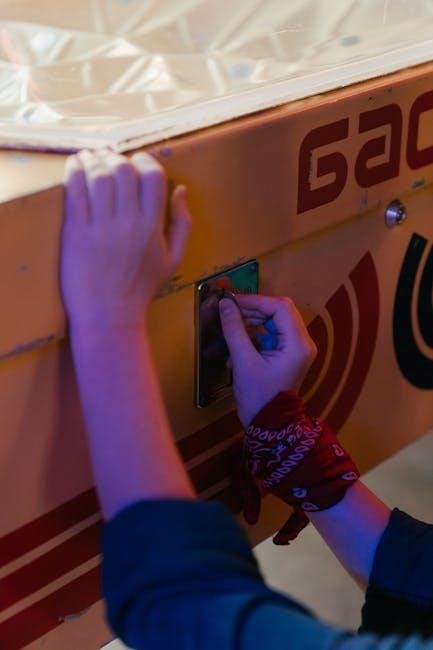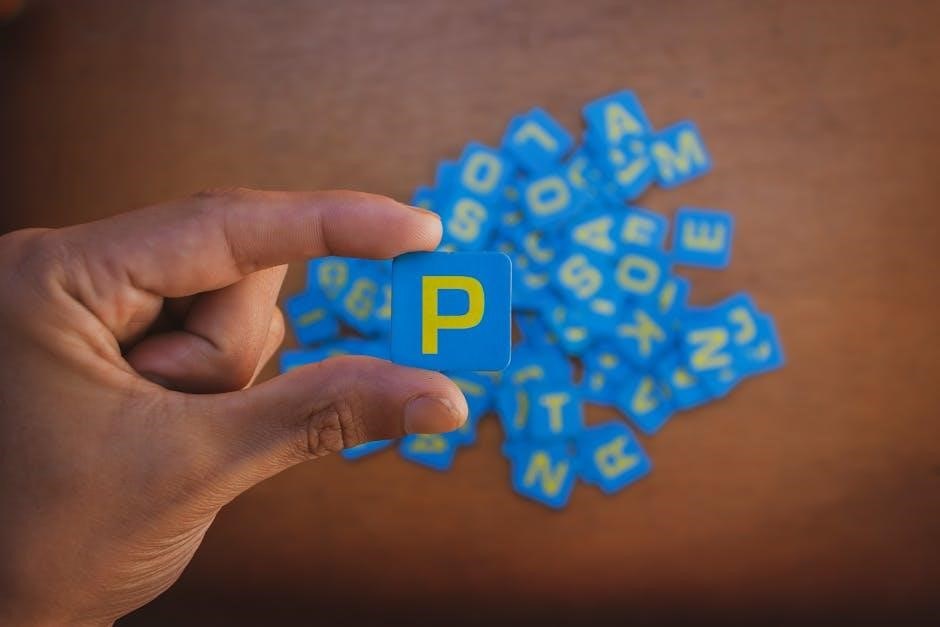FTC CenterStage Game Manual 2 provides detailed rules, scoring systems, and guidelines for both traditional and remote events in the 2023-2024 season.
1.1 Overview of the Manual
The FTC CenterStage Game Manual 2 serves as a comprehensive guide for the 2023-2024 season, detailing game rules, scoring systems, and event structures. It is divided into two parts, with Part 2 focusing specifically on game rules and requirements. The manual includes updates such as revised game rules, new features, and clarifications for both traditional and remote events. Teams must adhere to the guidelines to ensure compliance and fair competition. Accessibility options, including translated versions and audio formats, are also highlighted to support diverse team needs.
- Covers traditional and remote event specifics.
- Includes updated rules and scoring details.
- Provides accessibility options for inclusivity.
1.2 Importance for Teams
The FTC CenterStage Game Manual 2 is essential for teams to understand rules, scoring, and event structures. It ensures compliance, fair competition, and preparedness for both traditional and remote events. Teams rely on it to design robots, plan strategies, and avoid penalties. The manual also offers accessibility options, supporting diverse needs. Adhering to its guidelines is crucial for success in the 2023-2024 season.
- Ensures rule compliance and fair play.
- Guides robot design and strategy planning.
- Provides accessibility for all team members.
Traditional vs. Remote Events in FTC CenterStage
Traditional events occur in-person with physical fields, while remote events are virtual, using digital simulations. Both require strategic planning but differ in execution and logistics.
2.1 Key Differences
Traditional events feature in-person competitions with physical fields, while remote events are conducted virtually. Traditional setups include physical game elements like exchange stations and balance beams, whereas remote events rely on digital simulations. Scoring systems differ slightly, with traditional events focusing on physical object interactions and remote events using automated tracking. Event structures also vary, as traditional matches occur in real-time on a field, while remote events may involve pre-recorded or live digital submissions.
2.2 Event Structures
Traditional events follow a standard match format with in-person competitions, including setup guides for physical fields. Remote events utilize digital simulations, with teams submitting pre-recorded or live runs. Both formats include an Autonomous Period and Tele-Operated Period, but remote events often have additional submission guidelines. The manual provides detailed setup instructions for both scenarios, ensuring consistency and fairness. Updates include improved field configuration guides and accessibility features, such as audio formats for visually impaired participants.

Game Elements in FTC CenterStage
FTC CenterStage features traditional elements like balls and blocks, while remote-specific elements include virtual targets and digital obstacles, ensuring engaging gameplay in both formats.
3.1 Traditional Elements
In FTC CenterStage, traditional game elements include physical components like balls, blocks, and cones. Teams interact with these elements on the field to score points. The manual provides exact dimensions and setup guidelines, ensuring consistency across competitions. These elements are central to the game’s design and require precise robot interactions for successful gameplay. The manual also includes illustrations for better understanding. Always refer to andymark.com/FTC for precise measurements.
3.2 Remote-Specific Elements
Remote-specific elements in FTC CenterStage include virtual objects and digital interactions. These elements are designed for remote competitions, focusing on digital scoring and algorithm-based challenges. The manual outlines how teams interact with these virtual components, ensuring fair and consistent gameplay. Remote-specific elements emphasize innovation and adaptability, allowing teams to compete effectively in a virtual environment while maintaining the core competitive spirit of the game.

Scoring Systems in FTC CenterStage
The manual provides a detailed overview of scoring systems, including how points are earned and calculated in both traditional and remote competition formats.
4.1 Traditional Scoring
Traditional scoring in FTC CenterStage focuses on points earned through completing tasks like scoring game elements into goals, completing autonomous routines, and achieving endgame bonuses. Teams earn points based on the difficulty and timing of these actions. Penalties for rule violations, such as illegal moves or interference, can reduce overall scores. The scoring system emphasizes precision, strategy, and teamwork to maximize points during matches.
4.2 Remote Scoring Methods
Remote scoring in FTC CenterStage involves virtual evaluation of robot performance, with points awarded based on video submissions and data logs. Teams submit recorded matches, and reviewers assess achievements like autonomous tasks, game element manipulation, and endgame maneuvers. Scoring emphasizes adherence to rules and clear documentation to ensure fair and accurate point allocation. This method ensures participation equity for teams unable to attend in-person events.

Autonomous and Tele-Op Periods
The game features a 30-second Autonomous Period, where robots execute pre-programmed instructions, followed by a Tele-Operated Period, where drivers control the robot to score points.
5.1 Autonomous Period Rules
The Autonomous Period lasts 30 seconds, starting with a countdown (e.g., 3-2-1-go). Robots must operate autonomously using pre-programmed instructions without driver control. All actions during this period, including scoring and movements, must adhere strictly to the rules outlined in the FTC CenterStage Game Manual 2. Teams are responsible for ensuring their robots comply with all autonomous regulations to avoid penalties or disqualification.
5.2 Tele-Operated Period Strategies
The Tele-Operated Period lasts two minutes, during which drivers control the robot. Effective communication between drivers and coaches is crucial for maximizing points. Teams should focus on efficient scoring, alliance coordination, and adapting strategies based on game progression. Proper robot handling and quick decision-making are key to optimizing performance and minimizing penalties during this phase of the match.

Rules and Penalties in FTC CenterStage
The manual outlines essential rules and penalties to ensure fair competition. Teams must comply with all guidelines to avoid disqualifications and penalties that impact scoring.
6.1 General Rules Compliance
Teams must adhere to all rules outlined in the FTC CenterStage Game Manual 2. Compliance ensures fair competition and safety. The 30-second Autonomous Period starts with a countdown, and robots must operate via pre-programmed instructions. Field personnel manage the match flow, and human players must follow specific guidelines to avoid penalties. Proper robot inspection and rule adherence are mandatory for participation.
6.2 Common Penalties to Avoid
Teams must avoid penalties such as unsportsmanlike conduct, unauthorized robot modifications, and field interference. Robots exceeding field boundaries or damaging elements result in penalties. Human players mishandling game elements can also lead to deductions. Compliance with rules ensures fair play and avoids disqualification. Penalties can significantly impact scoring and team standing, emphasizing the need for rule adherence throughout the competition.
Field Setup and Configuration
The official Field Setup Guide provides detailed instructions for constructing the playing field, including exact dimensions and element placements, ensuring accurate configuration for competition.
7.1 Traditional Field Layout
The traditional field layout for FTC CenterStage is meticulously detailed in the official setup guide, ensuring a standardized playing environment. Teams must adhere to exact dimensions for elements like barriers, goals, and game-specific components. Proper configuration ensures fair competition and accurate scoring. Detailed measurements and assembly instructions are provided to guarantee consistency across all events. Compliance with these guidelines is essential for maintaining game integrity and fairness.
7.2 Remote Field Setup Guide
The remote field setup guide offers adaptable configurations for teams to replicate the traditional field environment. Simplified requirements ensure accessibility while maintaining core game elements. Teams can utilize available materials to construct key components, ensuring fair competition. Detailed instructions and visual aids are provided to help teams achieve accurate setups; This flexibility allows remote participants to engage fully in the FTC CenterStage game, fostering inclusivity and equal opportunity for all competitors worldwide.

Updates and Changes from Previous Manuals
FTC CenterStage Game Manual 2 introduces revised rules, updated scoring systems, and new game elements, ensuring clarity and consistency for the 2023-2024 season.
8.1 Revisions in Game Rules
FTC CenterStage Game Manual 2 includes clarifications on scoring, updated penalties, and adjustments to the autonomous period. Changes ensure consistency, fairness, and improved gameplay experience for all teams.
8.2 New Features Introduced
FTC CenterStage Game Manual 2 introduces enhanced accessibility features, including an audiobook version for visually impaired participants. New game elements and updated competition rules ensure an engaging experience.
Resources and Support for Teams
Official documentation links, community forums, and accessibility options like audiobooks provide comprehensive support for FTC teams in the CenterStage Game Manual 2.
9.1 Official Documentation Links
The FTC CenterStage Game Manual 2 and related documents are available on the official Game and Season Info page. This includes Game Manual Part 1 and Part 2, one-page descriptions, logos, and game animations. Teams can also access field setup guides, scoring overviews, and rules updates. Additional resources like translated manuals and audiobook versions are provided for accessibility. Visit the FTC website or GitHub repository for robot code examples and support materials.
9.2 Community Forums and Help
Teams can find support through the official FTC forums at ftcforum.firstinspires.org, where discussions and rulings are shared. Additional resources include community-driven initiatives like audiobook versions of the manual for accessibility. The GitHub repository provides code examples and robot project templates. These platforms foster collaboration, problem-solving, and innovation, ensuring teams stay updated and connected throughout the season.

Translation and Accessibility Options
The FTC CenterStage Game Manual 2 is available in multiple languages, with text-based versions for assistive devices, ensuring accessibility for all participants globally.
10.1 Available Translations
FTC CenterStage Game Manual 2 is translated into multiple languages, including Spanish, French, and Chinese, to ensure global accessibility. A text-based English version is also provided for assistive devices, making the manual inclusive for all participants. These translations are available on the official FTC website, allowing teams worldwide to access the rules and guidelines easily.
10.2 Accessibility Features
FTC CenterStage Game Manual 2 incorporates accessibility features, including an audiobook version for visually impaired participants. A text-based English version is provided for assistive devices. The manual adheres to clear formatting standards, such as large font options and high contrast modes, ensuring inclusivity for all users. These features aim to make the game rules and guidelines accessible to everyone, fostering equal participation globally.
FTC CenterStage Game Manual 2 concludes with key takeaways and tips, ensuring teams are well-prepared for competition. Stay updated, review rules, and utilize available resources for success.
11.1 Summary of Key Points
FTC CenterStage Game Manual 2 offers a comprehensive guide for teams, covering traditional and remote events, scoring systems, autonomous and tele-op periods, rules, field setup, and updates. It ensures clarity on game elements, penalties, and resources, providing a detailed roadmap for success. Teams are encouraged to review and adhere to the manual for optimal performance in the 2023-2024 season.
11.2 Best Practices for Teams
Teams should thoroughly review the FTC CenterStage Game Manual 2 to ensure compliance with all rules and updates. Utilize official resources, such as the Game Manual Part 1 and 2, for detailed instructions. Stay updated on forum rulings and field setup guides. Focus on understanding game elements, autonomous and tele-op strategies, and scoring systems. Prioritize pre-programmed instructions for autonomous periods and effective communication during matches. Regularly check for revisions and new features to maintain a competitive edge.